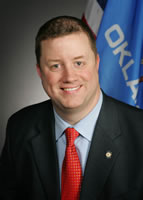In order to provide equal access and equal opportunity to people with diverse abilities, this site has been designed with accessibility in mind. Click here to view
Senate advances measure to provide scholarships to low income students
 Sen. Dan Newberry
Sen. Dan Newberry
In a victory for school choice in Oklahoma, the state Senate today approved legislation to broaden the number of private school scholarships awarded to children from low-income households.
Senate Bill 969, the Oklahoma Equal Education Opportunity Scholarship Act, will give businesses and individuals the opportunity to provide low-income students with expanded educational opportunities.
“In order to give every student a chance to learn, we must empower students and families with freedom of choice,” said Newberry, R-Tulsa. “This legislation will encourage private sector investment in the success of our low-income children, removing barriers to achievement and helping children build better lives. Expanding choice will create a more fertile climate for learning, improving our education system.”
Under the provisions of SB 969, students meeting financial need requirements or living in school districts identified for improvement under No Child Left Behind will be eligible for scholarships. Businesses and individual contributions will fund the scholarships and the state will grant tax credits to those that contribute. Individuals will receive a 50 percent annual credit for contributions up to $1,000, $2,000 for married couples filing jointly, and a 50 percent credit annually for corporations on contributions up to $100,000. There is a limit placed on total annual contributions, totaling $5 million.
Newberry noted the measure would increase the overall amount spent on primary education while saving the state tax dollars.
“An increase in private investment in Oklahoma education will help more children reach their potential,” Newberry said. “In addition, students ineligible for the scholarship will benefit from increased per-pupil funding, as districts experience savings on students no longer enrolled. Having worked hard on this legislation for two years, I look forward to seeing the measure signed into law.”
Senate Bill 969 now advances to the Governor.
 Oklahoma Senate
Oklahoma Senate

